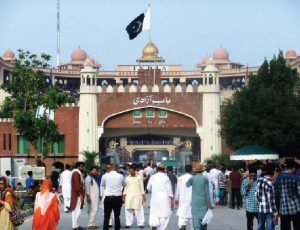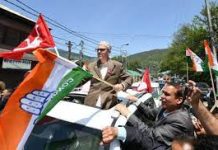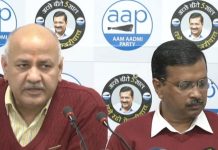Edited Excerpts from an interview •

Senior People’s Democratic Party leader
India has observed the first anniversary of the revocation of Article 370 on August 5. How do you look at the current situation in Kashmir?
It is difficult say anything definitively about it. It is still an evolving situation. But there is no doubt that Kashmir is under severe pressure. New Delhi has let everything lose on this place. And there seems to no end to it in the near term.
There is deep concern in Kashmir about the alleged attempts to change the demography of Kashmir following the issuance of new domicile rules. Similarly, according to the recent Control of Buildings Operations Act and Development Act, the army has been given freedom to take over land anywhere?
Government has subsequently issued clarifications about the Development Act. There have also been denials about the efforts being made to alter the demography of the region. But nobody in Kashmir is now ready to take the government on its word. Last year too the government was issuing clarifications, saying the then unprecedented security measures were intended for Amarnath Yatra. Then yatra was cancelled half way through its period for the first time in history. Rest is history. The issue is the administration faces a great credibility crisis among the people of Kashmir and it can’t restore unless there is a fundamental shift in the way the government handles things in J&K.
Ladakh has been recently in news. It appears that the India-China stand-off along the Line of Actual Control is in for a long haul?
Ladakh stand-off is just the symptom of the strategic shift that is taking place in the region. There’s a new strategic challenge that is taking shape. China is rising as a global power and its axis with Pakistan is now hemming in India. Its immediate fallout has been playing out in Ladakh.
But its larger fallout has been in geographic closure of India. South is closed, east is closed, west is closed. Look at the border with China and the border with Pakistan, all of it is closed for India.
Can as huge a country as India create any strategic influence in the modern world without friendly relations with its neighbours, especially with Pakistan whose strategic geography allows it an access to the wider world?
At the same time, the region is in the process of a new alignments. New blocks are being created in the neighborhood. There is China, Russia, Iran, Pakistan and Afghanistan. The difference between India and China is what Rahul Gandhi also pointed out in his recent video: China has decided it has to become a world power, that it wants to control the world. China had achieved this in 70 years. But India in 2014 decided it has to become a Hindurashtra. That’s their vision.
China’s new-found superpower status and its growing economic and power differential with India has created a huge asymmetry between the two countries. But, in a sense, the asymmetry is not between their forces like how many fighter planes each country has. Didn’t Vietnam defeat China in border war? This is about what is your national vision.
What is this difference in vision?
China has rediscovered the power of land routes. It was for a long time that sea was used for trade. China thinks big. These land routes are going to reshape the world. This change is happening after 2000 years. India is out of it. There’s a new strategic reality that is shaping up.
But the situation is different in India. In India the government has decided to convert a flourishing and inclusive democracy into a Hindurashtra. It doesn’t need even to change the constitution for that. It has already embarked on Kashmir experiment. Now Kashmir experiment is being extended to rest of the country.
What about Pakistan? It has now been years since India and Pakistan have talked?
Good relations with Pakistan are critical for India. And the biggest reason for this is the geographical access that Pakistan gives India to the world. Unless this western front is open to India, it will be incomplete. Any national ambition will not fructify, when it doesn’t enjoy a good relationship with a country in the West that can give it access to countries like Iran and central Asia with which it has had a long historical relationship. This is the time for India where the country has to choose whether it has to close itself up or open up to the neighborhood in its West.
What about the East? India has a Look East policy too?
In the east, on the other hand, India doesn’t have much of stakes. If there is a problem with Bangladesh, it has no detrimental impact as beyond Bangladesh India has no strategic interest. Bangladesh unlike Pakistan leads to no larger neighbourhood. So India’s strategic interest is tied with Pakistan. It is only because Pakistan territory is closed to India that it has been trying to reach the world beyond it through Chabahar, use air route to reach Afghanistan and go by sea to Gulf. The world is there on the west, not on the east, no matter the Look East policy. Sadly, now even Chabahar has been lost.
India can only open up through Pakistan, sooner or later. There’s no escape from this. That is the reality. A reality we have to face. Today or hundred years from now.
Over the past year noises have grow in India about annexing PoK?
Can that be realistically done? Rhetoric is one thing. Pakistan has become virtually a province of China. It is commanded by one person called General Bajwa. China has one commander in Tibet, one commander in Pakistan.
One of the biggest dangers of our antagonistic policy towards Pakistan is that more we alienate it, more are we pushing it closer to China. And if we don’t wake up to this reality sooner we are letting ourselves be encircled by a great wall of China on all the sides — north, east, west. Already north and west is closed to us because of China, Pakistan axis.
 Is India, Pakistan reconciliation still possible after the withdrawal of Article 370 in Kashmir? Don’t you think it would be a long time before their relations can recover from this shock?
Is India, Pakistan reconciliation still possible after the withdrawal of Article 370 in Kashmir? Don’t you think it would be a long time before their relations can recover from this shock?
Yes, that has been a huge setback. But I doubt the relations have reached a point of no return. With statesmanship on both sides, the situation can still be turned around. For example, when the Prime Minister Narendra Modi decided one day he should go and see Nawaz Sharif, who stopped him?
And yes, the PM Modi could have taken the process forward with Pakistan. More so, when Imran Khan had said that he was ready to go the extra mile and discuss Kashmir on pragmatic terms.
But I don’t think that situation can’t be salvaged. Ultimately we have to do business with Pakistan. Things are not going to move forward otherwise. Besides, Pakistan is the only willing party in this. China has shown, it is not going to deal with India honourably. And it won’t also be possible for Pakistan to open up to India indefinitely. More so, when the world is fast changing and the new cold war seems set to begin.
In recent past China has begun to aggressively assert itself on the global and regional stage?
China is a big factor on the global stage and consequently more so on the regional stage. I have had this belief for some years that China has been undermining India, Pakistan relations for some years. I believe that it is China that was protecting Jaish-e-Mohammad chief Masood Azhar. Just go by events that took place at the hands of Jaish over the years and how China for a long time protected Azhar. Let us go back right to the time when Masood Azhar was released from Kashmir jail in response to hijacking of IC-814, and how it was managed in Afghanistan. Then see what happened a week after Narendra Modi went to meet Nawaz Sharif, Pathankot was attacked.
Do you say that Pathankot was done by China?
Yes. Otherwise, why did China adopt Masood Azhar only. Why did it not do so for Hafiz Saeed and Salahuddin? Unfortunately India’s strategic community is numbed. They don’t want to see the reality. They are blindly toeing the line of the ruling class.
Where do you see the situation is headed in Kashmir, now that Article 370 move has become a fait accompli?
World keeps changing. Geopolitics changes. In 1990, the USSR broke up and the Central Asian states which were part of it became independent. When they were a part the USSR, the religion was banned, mosques were demolished. Also Russian population was settled in these states. Now, these states are again independent. Also the world has come a long way since 1989. Many a geopolitical shift have taken place in last three decades. It is difficult to speculate where the world will be in another three.
letters@tehelka.com













